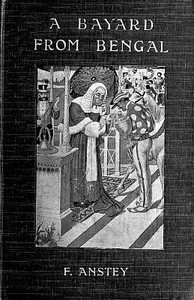The Tinted Venus: A Farcical Romance, F. Anstey [best novels in english txt] 📗

- Author: F. Anstey
Book online «The Tinted Venus: A Farcical Romance, F. Anstey [best novels in english txt] 📗». Author F. Anstey
"There isn't a soul inside," protested Tweddle, with unnecessary warmth; "not a solitary soul! You wanted to talk with me. Suppose we take a turn round the square?"
"No, no. I won't keep you out; I'll come in with you!"
Inwardly wondering what his visitor wanted, Leander led him in and lit the gas in his hair-cutting saloon. "We shall be cosier here," he said; for he dared not take the stranger up in the room where the statue was concealed, for fear of accidents.[Pg 69]
The man sat down in the operating-chair and crossed his legs. "I dare say you're wondering what I've come about like this on a Sunday afternoon?" he began.
"Not at all," said Leander. "Anything I can have the pleasure of doing for you——"
"It's only to answer a few questions. I understand you lost a ring at the Rosherwich Gardens yesterday evening: that's so, isn't it?"
He was a military looking person, as Leander now perceived, and he had a close-trimmed iron-grey beard, a high colour, quick eyes, and a stiff hard-lipped mouth—not at all the kind of man to trifle with. And yet Leander felt no inclination to tell him his story; the stranger might be a reporter, and his adventure would "get into the papers"—perhaps reach Matilda's eyes.
"I—I dropped a ring last night, certainly," he said; "it may have been in the gardens, for what I know."
"Now, now," said the stranger, "don't you know it was in the gardens? Tell me all about it."
"Begging your pardon," said Leander, "I should like to know first what call you have to be told."
"You're quite right—perfectly right. I always deal straightforwardly when I can. I'll tell you who I am. I'm Inspector Bilbow, of the Criminal Investigation Department, Scotland Yard. Now, perhaps, you'll see I'm not a man to be kept in the dark. And I want you to tell me when and where you last saw that ring of yours: it's to your own interest, if you want to see it again."
But Leander had seen it again, and it seemed certain that all Scotland Yard could not assist him in getting it back; he must manage it single-handed.
"It's very kind of you, Mr. Inspector, to try and find it for me," he said; "but the fact is, it—it ain't so[Pg 70] valuable as I fancied. I can't afford to have it traced—it's not worth it!"
The inspector laughed. "I never said it was, that I know. The job I'm in charge of is a bigger concern than your trumpery ring, my friend."
"Then I don't see what I've got to do with it," said Leander.
The officer had taken his measure by this time; he must admit his man into a show of confidence, and appeal to his vanity, if he was to obtain any information he could rely upon.
"You're a shrewd chap, I see; 'nothing for nothing' is your motto, eh? Well, if you help me in this, and put me on the track I want, it'll be a fine thing for you. You'll be a principal witness at the police-court; name in the papers; regular advertisement for you!"
This prospect, had he known it—but even inspectors cannot know everything—was the last which could appeal to Leander in his peculiar position. "I don't care for notoriety," he said loftily; "I scorn it."
"Oho!" said the inspector, shifting his ground. "Well, you don't want to impede the course of justice, do you?—because that's what you seem to me to be after, and you won't find it pay in the long run. I'll get this out of you in a friendly way if I can; if not, some other way. Come, give me your account, fair and full, of how you came to lose that ring; there's no help for it—you must!"
Leander saw this and yielded. After all, it did not much matter, for of course he would not touch upon the strange sequel of his ill-omened act; so he told the story faithfully and circumstantially, while the inspector took it all down in his note-book, questioning him closely respecting the exact time of each occurrence.[Pg 71]
At last he closed his note-book with a snap. "I'm not obliged to tell you anything in return for all this," he said; "but I will, and then you'll see the importance of holding your tongue till I give you leave to talk about it."
"I shan't talk about it," said Leander.
"I don't advise you to. I suppose you've heard of that affair at Wricklesmarsh Court? What! not that business where a gang broke into the sculpture gallery, one of the finest private collections in England? You surprise me!"
"And what did they steal?" asked Leander.
"They stole the figure whose finger you were ass enough (if you'll allow me the little familiarity) to put your ring on. What do you think of that?"
A wild rush of ideas coursed through the hairdresser's head. Was this policeman "after" the goddess upstairs? Did he know anything more? Would it be better to give up the statue at once and get rid of it? But then—his ring would be lost for ever!
"It's surprising," he said at last. "But what did they want to go and burgle a plaster figure for?"
"That's where it is, you see; she ain't plaster—she's marble, a genuine antic of Venus, and worth thousands. The beggars who broke in knew that, and took nothing else. They'd made all arrangements to get away with her abroad, and pass her off on some foreign collection before it got blown upon; and they'd have done it too if we hadn't been beforehand with them! So what do they do then? They drive up with her to these gardens, ask to see the manager, and say they're agents for some Fine Arts business, and have a sample with them, to be disposed of at a low price. The manager, so he tells me, had a look at it, thought it a neat article and suitable to the style of his gardens. He took it to be plain plaster,[Pg 72] as they said, and they put it up for him their own selves, near the small gate up by the road; then they took the money—a pound or two they asked for it—and drove away, and he saw no more of them."
"And was that all they got for their pains?" said Leander.
The inspector smiled indulgently. "Don't you see your way yet?" he asked. "Can't you give a guess where that statue's got to now, eh?"
"No," said Leander, with what seemed to the inspector a quite uncalled-for excitement, "of course I can't! What do you ask me for? How should I know?"
"Quite so," said the other; "you want a mind trained to deal with these things. It may surprise you to hear it, but I know as well how that statue disappeared, and what was done with her, as if I'd been there!"
"Do you, though?" thought Leander, who was beginning to doubt whether his visitor's penetration was anything so abnormal. "What was done with her?" he asked.
"Why, it was a plant from the first. They knew all their regular holes were stopped, and they wanted a place to dump her down in, where she wouldn't attract attention, till they could call for her again; so they got her taken in at the gardens, where they could come in any time by the gate and fetch her off again—and very neatly it was done, too!"
"But where do you make out they've taken her to now?" asked Leander, who was naturally anxious to discover if the official had any suspicions of him.
"I've my own theory about that," was his answer. "I shall hunt that Venus down, sir; I'll stake my reputation on it."[Pg 73]
"Venus is her name, it seems," thought Leander. "She told me it was Aphrodite. But perhaps the other's her Christian name. It can't be the Venus I've seen pictures of—she's dressed too decent."
"Yes," repeated the inspector, "I shall hunt her down now. I don't envy the poor devil who's giving her house-room; he'll have reason to repent it!"
"How do you know any one's giving her house-room?" inquired Leander; "and why should he repent it?"
"Ask your own common sense. They daren't take her back to any of their own places; they know better. They haven't left the country with her. What remains? They've bribed or got over some mug of an outsider to be their accomplice, and a bad speculation he'll find it, too."
"What would be done to him?" asked the hairdresser, with a quite unpleasant internal sensation.
 "WHAT WOULD BE DONE TO HIM?" ASKED THE HAIRDRESSER, WITH A QUITE UNPLEASANT INTERNAL SENSATION.
"WHAT WOULD BE DONE TO HIM?" ASKED THE HAIRDRESSER, WITH A QUITE UNPLEASANT INTERNAL SENSATION.
"That is a question I wouldn't pretend to decide; but I've no hesitation in saying that the party on whose premises that statue is discovered will wish he'd died before he ever set eyes on her."
"You're quite right there!" said Leander. "Well, sir, I'm afraid I haven't been much assistance to you."
"Never mind that," said the inspector, encouragingly; "you've answered my questions; you've not hindered the law, and that's a game some burn their fingers at."
Leander let him out, and returned to his saloon with his head in a worse whirl than before. He did not think the detective suspected him. He was clearly barking up the wrong tree at present; but so acute a mind could not be long deceived, and if once Leander was implicated his guilt would appear beyond denial. Would the police believe that the statue had run after him? No one[Pg 76][Pg 75][Pg 74] would believe it! To be found in possession of that fatal work of art would inevitably ruin him.
He might carry her away to some lonely spot and leave her, but where was the use? She would only come back again; or he might be taken in the act. He dared not destroy her; his right arm had been painful all day after that last attempt.
If he gave her up to the authorities, he would have to explain how he came to be in a position to do so, which, as he now saw, would be a difficult undertaking; and even then he would lose all chance of recovering his ring in time to satisfy his aunt and Matilda. There was no way out of it, unless he could induce Venus to give up the token and leave him alone.
"Cuss her!" he said angrily; "a pretty bog she's led me into, she and that minx, Ada Parkinson!"
He felt so thoroughly miserable that hunger had vanished, and he dreaded the idea of an evening at home, though it was a blusterous night, with occasional vicious spirts of rain, and by no means favourable to continued pacing of streets and squares.
"I'm hanged if I don't think I'll go to church!" he thought; "and perhaps I shall feel more equal to supper afterwards."
He went upstairs to get his best hat and overcoat, and was engaged in brushing the former in his sitting-room, when from within the cupboard he heard a shower of loud raps.
His knees trembled. "She's wuss than any ghost!" he thought; but he took no notice, and went on brushing his hat, while he endeavoured to hum a hymn.
"Leander!" cried the clear, hard voice he knew too well, "I have returned. Release me!"
His first idea was to run out of the house and seek[Pg 77] sanctuary in some pew in the opposite church. "But there," he thought disgustedly, "she'd only come in and sit next to me. No, I'll pluck up a spirit and have it out with her!" and he threw open the door.
"How have you dared to imprison me in this narrow tomb?" she demanded majestically, as she stepped forth.
Leander cringed. "It's a nice roomy cupboard," he said. "I thought perhaps you wouldn't mind putting up with it, especially as you invited yourself," he could not help adding.
"When I found myself awake and in utter darkness," she said, "I thought you had buried me beneath the soil."
"Buried you!" he exclaimed, with a sudden perception that he might do worse.
"And in that thought I was preparing to invoke the forces that lie below the soil to come to my aid, burst the masses that impeded me, and overwhelm you and all this ugly swarming city in one vast ruin!"
"I won't bury her," Leander decided. "I'm sorry you hadn't a better opinion of me, mum," he said





Comments (0)